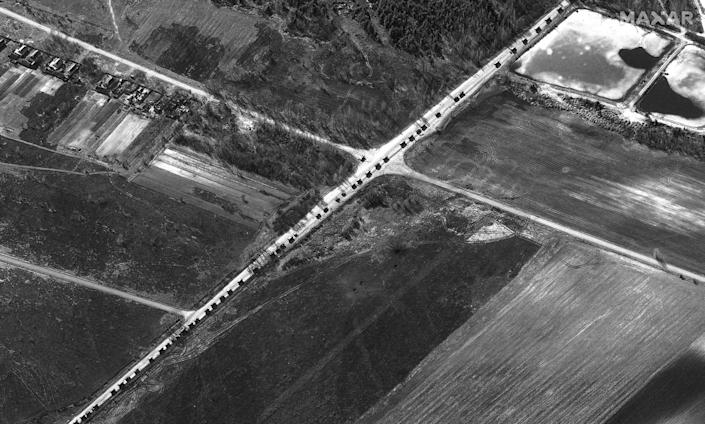Russian President Vladimir Putin is now determined to ruthlessly crush Ukrainian resistance no matter what the cost to his country and the Ukrainians fighting Russian forces are “all going to die,” says a former CIA station chief in Moscow.
In an interview on the Yahoo News “Skullduggery” podcast, Daniel Hoffman — for years, one of the CIA’s top experts on Russia — said the Russian president is “not the Vladimir Putin I was tracking back in the day at the CIA. He’s a different guy.” He says that Putin has dug himself into such a deep hole with the Ukraine invasion that he now no longer believes he has any choice but to level the country.
Ukrainian President Volodymyr Zelensky has inspired his country and much of the world, becoming “the great 21st century communicator” in resisting Putin’s invasion, he said. But, in the end, “I think Ukraine’s darkest days are ahead of them, tragically,” Hoffman said. “So, Vladimir Putin, he’s going to burn down Ukraine’s house.”
What follows is an edited transcript of Hoffman’s conversation with Michael Isikoff, chief investigative correspondent for Yahoo News, Daniel Klaidman, Yahoo News Editor in Chief, and Victoria Bassetti, a fellow with the Brennan Center for Justice.
Isikoff: As we sit here today, the reports are of this Russian military convoy, 40 miles long, headed right to Kyiv. What do you expect over the next 24 to 48 hours from the Russians? How far is Vladimir Putin going to go?
I think Ukraine’s darkest days are ahead of them, tragically. I will tell you that this isn’t the Vladimir Putin I was tracking back in the day at CIA. He’s a different guy. He won a lot of wars — a brutal war in Chechnya. He invaded Georgia in 2008, but didn’t try to take Tbilisi. He invaded Ukraine in ’14 and annexed Crimea, and invaded the Donbas, and kind of settled on a frozen conflict there.
All those things were, Vladimir Putin playing chess with limited but achievable objectives. This one Vladimir Putin has altered his risk calculus. He’s playing poker where he might not have the strongest hand. But I am deeply fearful we’re going to see something like Grozny or Aleppo where Russia goes scorched earth, because they have failed, utterly failed, thus far.
Klaidman: We’ve seen this incredible resistance from the Ukrainians, very inspiring. How does [Putin] deal with that? And, ultimately, is he going to try to just break their spirit by going after civilians?
Russia has a different view of collateral damage, and they have a different view of casualties for their own. In our rules of engagement in the U.S., we do the best we possibly can not to strike civilian targets. For the Russians, just look at the battle of Stalingrad. That’s kind of the way Vladimir Putin sees the world. Think about the poisoning of [Russian dissident Alexander] Litvinenko with radioactive polonium-210. He created a human dirty bomb. There just is an “ends justify whatever means you want to use.” That’s kind of the way that they do things.
And I’ll just tell you a quick story., I asked once a long time ago a Russian intelligence officer, I asked him, “What is it about your neighbors and your tactics for dealing with them?” And he said to me, “Listen, let’s just say you have a really nice house, and I don’t. My house is a crappy house. I’m just gonna go burn yours down. That’s kind of the way we think.”
So Vladimir Putin, he’s going to burn down Ukraine’s house, and he feels like he can’t exist on this planet if Ukraine is striving for freedom, liberty, and democracy and economic links to the West. That was where they were headed, and Vladimir Putin can’t let that happen. … And this is why I get back to the risk calculus for Vladimir Putin. He could have probably gotten autonomy for Donbas. He could’ve probably eliminated a bunch of sanctions, and he might’ve been able to extract other concessions from us. … There was no way a week ago that France and Germany were going to admit Ukraine [to NATO.]
And now, thanks to Zelensky, who’s an extraordinary leader, it’s NATO joining Ukraine in a fight for freedom. Standing up for what matters. It’s like Zelensky jolted Western democracies out of a post-Cold War slumber, and here they are, taking on a brutal dictator who is an anathema to everything that we believe in. That’s the story for me.
Bassetti: So if Putin is no longer the man that you’ve been studying for the majority of your career, how are Western states today adapting to this new understanding?
I can tell you, the number one recurring question that President Biden is asking the intelligence community is “give me the leadership profile on Vladimir Putin. No, no, no, no, no. Not the one from February ’22. I need the one from today.” Because he’s not the same guy. There are all kinds of rumors about whatever might be wrong with him medically. Sen. Marco Rubio said that he had neuropsychological issues. Rubio sits on a Senate intel committee, wouldn’t go into detail about sources and methods, wouldn’t go into further detail about exactly what that means. But that’s a very important statement that he made. … And so what we might see are the Russian elites changing their assessment of Vladimir Putin. Those elites who are watching him and thinking, “Holy s***, we thought this was brinkmanship. And he’s taken us to a war that is destroying our economy.”
Isikoff: You say he’s not the guy you tracked for many years. And yet, many of the examples you cited about Putin’s brutality have been a matter of public record for decades — the horrific leveling of Chechnya, the polonium poisoning of Litvinenko. That was 2006. Then the invasion of Georgia was 2008. And as you look back, did we not do enough to deter him much much earlier?
So you have a good long list there. I’ll add a few more. Downing a Malaysian airliner. Interfering in our elections. And European elections. He has gotten away with a lot. And it’s telling that after — I remember this extremely well — after Russia invaded Georgia, and what’s the policy of the Obama administration? Reset. Excuse me, but at the time, I was thinking, like, “What the f***, reset? Are you kidding me? With this guy, after what he just did?”
Isikoff: One quick follow up on U.S. policy over the years. In 1991, Saddam Hussein invaded Kuwait. And the United States and Western allies went to war to expel him. Now, we have Vladimir Putin invading Ukraine, and President Biden has taken the use of U.S. troops off the table. How do you square the way we responded to Saddam Hussein in 1991, with how we are responding to Vladimir Putin in 2022?
I’m glad you asked that, because I’ve thought so much about it. I had already begun serving in the government when Saddam invaded Kuwait. And President George Herbert Walker Bush built a global coalition. And we deployed in defense of Saudi Arabia, and then launched that invasion. But it was a global coalition. And we took the lead. … The difference obviously is that Russia has nuclear weapons.
And what this administration is trying to do is thread the needle. … So we’re going to try to provide Ukraine with the military and humanitarian assistance that they need. We’re going to use lots of economic pressure on Russia. But direct, kinetic conflict? No. … And so I think, If it were me, I would have suggested that President Biden not rule anything out. I don’t know why he said we aren’t going to put troops there. You don’t need to tell the enemy what we’re doing or what we’re thinking about. He should’ve said, “Look, everything’s on the table.”
And the other thing I would just say is, in contrast to 1990-1991, the guy who’s built the coalition? It’s Zelensky. … What has brought us all together has been this Ukrainian freedom fighter, a Jewish comedian is kicking the s*** out of Vladimir Putin. He is a 21st century leader who understands social media and understands how to get the message out to his own people and to get the kind of support that he needs internationally. If you listen to his speech today to the European Parliament, I mean, just extraordinary ability that he has to communicate. He is the great 21st century communicator. … He’s got the world — at least those of us in the West who believe in freedom, liberty and democracy — rising up in support of those sacred principles, enshrined in our Constitution’s Bill of Rights, on the Ukrainian battlefield.
Bassetti: So, Dan, when you were in the intelligence community, you were paid to understand the leaders of rival nations, including Putin. I know that you can’t be inside his head, but you must have theories as to why he has evolved the way he has. I mean, you know, from being this calculated, calculating, cunning, person who knows where the limits are, to what he’s doing now. What is your theory?
So my theory is he’s a guy who likes to project strength. He’s a guy who likes to ride his horses half naked and do judo throws and look like a tough guy. But time is not on Russia’s side, and he’s weaker before he attacked Ukraine. He was weaker than he was five years ago, 10 years ago. He is haunted by the Orange Revolution in Ukraine, the Arab Spring, neighbors that are prosperous, NATO members like the Baltic states that are prosperous economically. And he’s haunted by the fact that his own country, men and women are extremely disenchanted with his leadership. And, so he sees this threat from Ukraine that is going to blow right back on his regime’s security in a way that he just can’t allow because he’s weaker. He can’t withstand it anymore
You know, he killed Boris Nemtsov in 2015. … I mean, good guy. I met him in Estonia. Smart guy. Why did he do that? Well, he did it ‘cause he’s gotta show he’s the most ruthless guy. You know, that’s the reason. Why did he try to kill Navalny with a banned chemical nerve agent that’s got bread crumbs leading all the way back to the Kremlin? Same thing with Skripal. Because you’ve gotta show that, “If you mess with me, if you betray me, I will kill you, and I’m gonna do it in a way that you’re not gonna like.”
You know, he could have taken a hammer to Skripal’s head and killed him. Same thing with Navalny. But they had to show, Putin had to show that he was still the most ruthless guy. He’s gotta show his own, his own guys, that he’s that. And he’s gotta show the population writ large.
The last thing I wanna tell you is he lived through the KGB coup in 1991 against Gorbachev when the population was up in arms about the failures, the expectations were rising with Glasnost and Perestroika. But then they realized, behind that, is zero.
And, so, the KGB saw that Gorbachev just wasn’t the guy. You had to be more ruthless, not less ruthless. And they removed him. And that is why Vladimir Putin ultimately — perceiving himself as weaker than he’s ever been, in my estimation — lashes out at Ukraine. And that was ramification for how this ends, which is only gonna get worse. And the ultimate question is whether the Russian military decides they’ve had enough committing war crimes and they decide, “You know what? This Vladimir Putin guy is gonna have to be thrown off to the side, cast aside, take the blame for all of this. ‘We were just following orders, sir,'” and move on.
Bassetti: Is there any off ramp from this right now? Aside from what you just described, which is either complete devastation to Ukraine or an internal coup?
Vladimir Putin is super close to not having an off ramp. Could he have one today? He might. But he’s also got to know that even if he goes and chooses the diplomatic off ramp, his own inner circle is going to say, “What the f*** did you just do to our economy and our standing in the world? And you made us look pretty bad too.” And then the knives come out and he gets stabbed in the back and the face, and he’s done.
Isikoff: You have been a Fox News contributor for a number of years now. I’d like to know what goes through your mind when you hear somebody like Tucker Carlson on Fox News defending Vladimir Putin, saying, “He’s never done anything to you or me. Why should we support Ukraine over Russia?” Which is a message that is resonating with some large segment of the Fox News audience.
I’ve never been on Tucker’s show, but I’ll leave my Fox News colleagues out of it. I’ll just say that, probably like everybody, when I watch the news and I watch lots of different programs. And I am a faithful listener of the “Skullduggery” podcast, and there’s things that I agree with, and there are things that I don’t agree with. And at the end of the day all I can do — and as I found this at CIA, too — all I can do is deliver my analysis with no predisposed ideological bias.
Isikoff: Let me just ask it another way, leaving aside your Fox News colleagues. Are you concerned that Russian propaganda is permeating the American political dialogue and we have folks in this country who are effectively fifth columnists — opposing U.S. policy, supporting Russian policies?
I think there’s a spectrum there. So, in our domestic scene, there is a swath of people in this country who say, “I’m tired of the Iraq, Afghanistan wars. I want out.” Very similar to the isolationism that we saw in the ’20s and ’30s. … And that’s a swath of our population [that] are susceptible to the, “Hey, Ukraine’s far away. Why should we care about Ukraine? What does that matter?” What I always tell people is the lesson of the last century was that when we are not involved with the major issues of the world, then we pay the price.
Klaidman:Before we wrap here, I just want to go back to Putin’s tactics against the Ukrainians. There was a lot of talk about how he was going to send in teams of saboteurs and assassins and either kidnap or assassinate Zelensky. That hasn’t happened yet.
Look, I think that would have been part of the plan to send in mercenaries to conduct a “non-attributable decapitation strike” against Ukrainian government leadership. They would’ve sent them in, weeks, months before the attack in order to be there to conduct surveillance and mount these attacks. The fact that Zelensky is still alive means they haven’t been successful. But I don’t doubt that they’re there. I don’t doubt that the FSB is there. …I also think Ukraine knows their neighbor. And so they’ve taken counter measures, and good on ’em for doing it.
Bassetti: I have a question for you. You said there are really dark days ahead for Ukraine. Now, how do you assess how long they’re gonna be able to hold out?
They’ll all die. They’ll hold out to the end, until they’re all dead.




